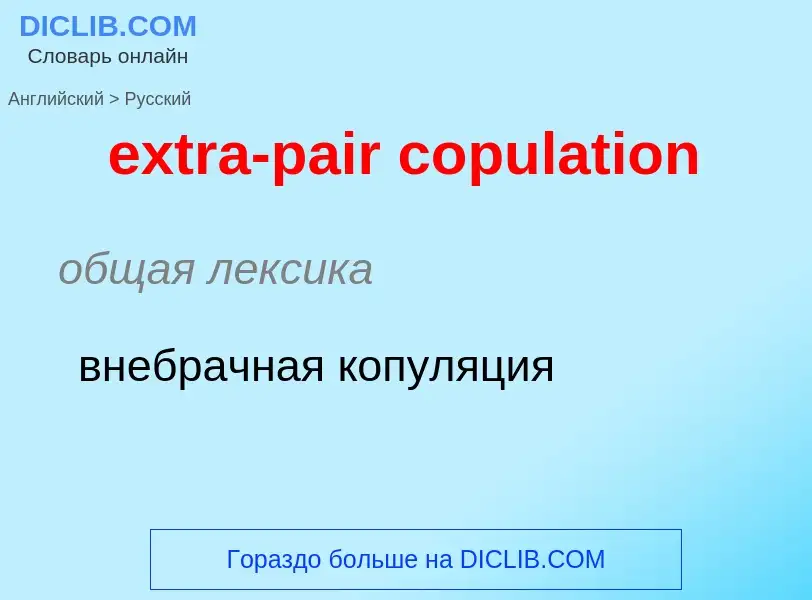Μετάφραση και ανάλυση λέξεων από την τεχνητή νοημοσύνη ChatGPT
Σε αυτήν τη σελίδα μπορείτε να λάβετε μια λεπτομερή ανάλυση μιας λέξης ή μιας φράσης, η οποία δημιουργήθηκε χρησιμοποιώντας το ChatGPT, την καλύτερη τεχνολογία τεχνητής νοημοσύνης μέχρι σήμερα:
- πώς χρησιμοποιείται η λέξη
- συχνότητα χρήσης
- χρησιμοποιείται πιο συχνά στον προφορικό ή γραπτό λόγο
- επιλογές μετάφρασης λέξεων
- παραδείγματα χρήσης (πολλές φράσεις με μετάφραση)
- ετυμολογία
extra-pair copulation - translation to ρωσικά
общая лексика
внебрачная копуляция
[,əu'pɛə(gə:l)]
общая лексика
помощница по хозяйству (иностранка; обыкн. молодая девушка, овладевающая языком; за выполнение домашней работы получает жильё, питание и карманные деньги)
Франция
на равных (правах)
Ορισμός
Βικιπαίδεια
Extra-pair copulation (EPC) is a mating behaviour in monogamous species. Monogamy is the practice of having only one sexual partner at any one time, forming a long-term bond and combining efforts to raise offspring together; mating outside this pairing is extra-pair copulation. Across the animal kingdom, extra-pair copulation is common in monogamous species, and only a very few pair-bonded species are thought to be exclusively sexually monogamous. EPC in the animal kingdom has mostly been studied in birds and mammals. Possible benefits of EPC can be investigated within non-human species, such as birds.
For males, a number of theories are proposed to explain extra-pair copulations. One such hypothesis is that males maximise their reproductive success by copulating with as many females as possible outside of a pair bond relationship because their parental investment is lower, meaning they can copulate and leave the female with minimum risk to themselves. Females, on the other hand, have to invest a lot more in their offspring; extra-pair copulations produce a greater cost because they put the resources that their mate can offer at risk by copulating outside the relationship. Despite this, females do seek out extra pair copulations, and, because of the risk, there is more debate about the evolutionary benefits for females.

![Pair of [[white-handed gibbons]] Pair of [[white-handed gibbons]]](https://commons.wikimedia.org/wiki/Special:FilePath/Hylobates lar pair of white and black 02.jpg?width=200)
![Pair of [[zebra finches]]: [[Bird Kingdom]], [[Niagara Falls]], [[Ontario]], Canada Pair of [[zebra finches]]: [[Bird Kingdom]], [[Niagara Falls]], [[Ontario]], Canada](https://commons.wikimedia.org/wiki/Special:FilePath/Taeniopygia guttata -Bird Kingdom, Niagara Falls, Ontario, Canada -pair-8a.jpg?width=200)

